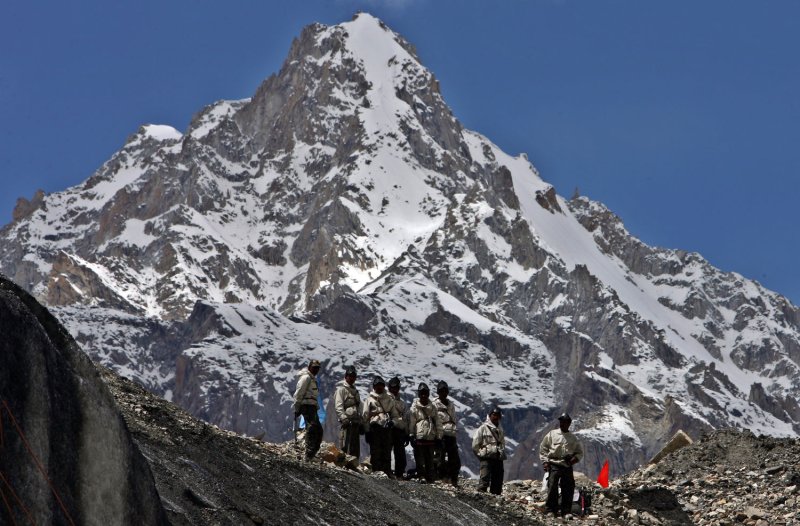Indian soldiers stand at a glacier near base camp of Siachen, India on May 5, 2007. The Siachen Glacier, located in the eastern Karakoram Range in the Himalaya mountains, is also the highest battleground on earth, where India and Pakistan maintain permanent military personnel at a height of over 6,000 meters. (UPI Photo) |
License Photo
GIARI, Pakistan, April 25 (UPI) -- Pakistani army Gen. Ashfaq Kayani's comments on the Siachen dispute indicate possible progress regarding the glacial area high in the Himalayas.
Kayani is Pakistan's chief of army staff. While visiting the Giari sector on the Siachen glacier, where a devastating avalanche on April 7 killed 138 soldiers, Kayani spoke of demilitarization and how necessary it was for India and Pakistan to live together in "peaceful coexistence."
Kayani's comments are all the more notable because he rarely speaks to the media, Asia News Network reported.
The Siachen Glacier, the world's largest non-polar glacier, overlooks the strategic Karakoram Pass and is part of the disputed territory of Jammu and Kashmir. Besides India and Pakistan, China also retains territory in Kashmir.
India and Pakistan have disagreed over sovereignty of the glacier since July 1949, when the Cease-Fire Line Agreement was signed in Karachi by ranking military representatives of India and Pakistan and the U.N. Military Observer Group.
Kayani said the high-altitude standoff has been costly in many ways, from defense spending to the environmental impact of deployments in the area.
Commenting on the consequences of the avalanche Kayani observed, "I think this is one good enough reason that this area should not be militarized."
Kayani's comments received surprisingly strong support in Pakistan, where opposition leader Nawaz Sharif picked up on the theme and went so far as to call for a unilateral Pakistani withdrawal from Siachen.
In New Delhi Indian Defense Minister A.K. Antony welcomed the development, referring to the high human and fiscal cost of the military confrontation on the glacier, which is consumingd resources that could better be deployed for other needs.
Fighting in the region ended with a cease-fire in December 2003. Since then, neither India nor Pakistan has released official figures on Siachen troop deployments. Estimates are that India has about 5,000 soldiers in the disputed territory and Pakistan around half that number.
Discussions on Siachen are to resume shortly at the defense minister level. Both Pakistan and India are well aware of the preoccupations of the other in resuming the talks and, in the currently improved political atmosphere, it may be possible for the sides to agree on constructive steps to improve matters in Siachen by discussing possible modes of disengagement for their armed troops stationed there.
While Kayani's call has resonated in the corridors of power in both Islamabad and New Delhi, the general prefers to leave the fine details to the politicians, saying, "How it is done is to be decided by the military and civil leaderships" of the two countries.





